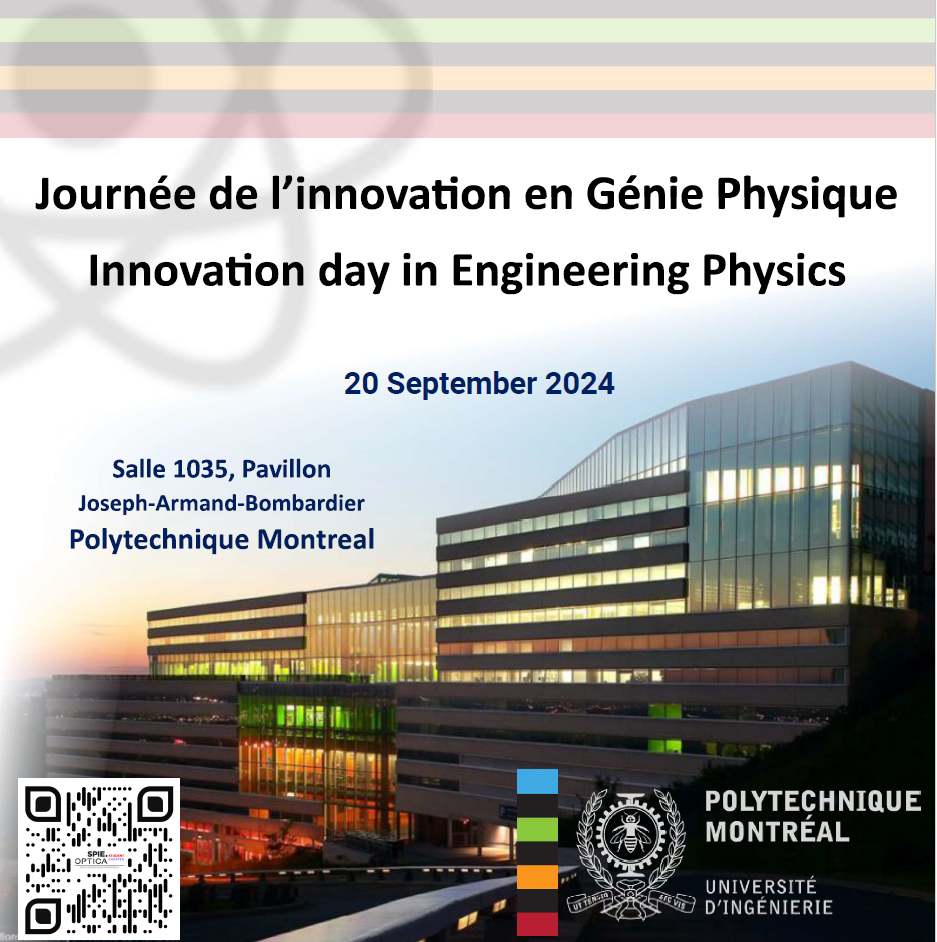Journée de l’Innovation en Génie Physique 2024 / Innovation Day in Engineering Physics 2024
(An English version will follow)
Vous êtes invités à assister à la 6e Journée de l’Innovation en Génie Physique le 20 septembre au 1035 du Pavillon Joseph-Armand-Bombardier à 13h00.
----
You are invited to attend the 6th edition of the Innovation Day in Engineering Physics on September 20th, at Room 1035, Joseph-Armand-Bombardier Building at 13h00.
Date and Time
Location
Hosts
Registration
-
 Add Event to Calendar
Add Event to Calendar
- 5155 Chemin de la Rampe
- Polytechnique Montreal
- Montréal, Quebec
- Canada H3T 1J4
- Building: Pavillon Joseph-Armand Bombardier
- Room Number: Salle 1035
- Click here for Map
- Contact Event Hosts
-
Optica-SPIE Student Chapter Polytechnique Montéal <osa.spie.polymtl@gmail.com>
- Co-sponsored by Chapitre Etudiant SPIE/OPTICA - Polytechnique
Speakers
Sébastien Loranger, Ph.D. of Polytechnique Montréal
Random photonic structures for cybersecurity and high-performance distributed sensors
Fiber Bragg gratings (FBGs) are photonic crystals with a high degree of order and coherence, giving them an extremely narrow spectral profile, which is the foundation of their many applications, such as add-drop filters, laser reflectors, dispersion control, optical sensors, and more. But what happens when we break the coherence of Bragg gratings by introducing significant randomness to the phase? Surprisingly, such incoherent structures have demonstrated intriguing applications, including ultra-low-threshold lasers, high-speed true random number generators (via random lasing), high-performance distributed sensing, and physical unclonable functions for ultra-secure authentication. Most interestingly, these structures are remarkably easy to create, as they are noise-generated and do not require precise fabrication constraints. This talk will focus on the last two applications, where the properties of highly random FBGs can be remotely probed to either gather environmental data or serve as an unclonable key. In fact, random FBGs present a novel solution for long-range distributed sensing, offering significantly improved performance while being more cost-effective than scattering-based or coherent FBG-based techniques. When randomness is maximized, the FBG can be used as an unclonable "fingerprint" that can be interrogated remotely via a communication link, helping to address a major cybersecurity challenge: authentication
Biography:
Sébastien Loranger graduated from his PhD at Polytechnique Montréal in Engineering Physics. He then did a post-doctoral fellowship at the renowned Max-Planck Institute in Erlangan, Germany, after which he went to acquire industrial experience as a R&D researcher at Photonova Inc. and ITF Technologies before joining Polytechnique as a professor.
Angeles Camacho Rosales, Ph.D. of Coractive
TBA
Biography:
Angeles Camacho Rosales is a leader in New Product Development for Optical Fibers at Coractive Inc. She holds a Ph.D. in Optoelectronics from the University of Southampton, where she collaborated on the EPSRC project "Novel Multiple Materials Additive Manufacturing Instrument for the New Generation of Optical Fiber Fabrication."
After the successful completion of her Ph.D. in 2020, Angeles contributed her expertise to the Nanophotonics group at the Zepler Institute, serving as a Research Fellow in the EPSRC project "Composite Material Hollow-Core Fibers for Active Photonics."
Passionate about fostering international research collaboration, Angeles has a proven track record of coordinating impactful initiatives. Her portfolio includes organizing international seminars, workshops, and mentoring programs, as well as facilitating multinational network collaboration. Angeles's dedication extends beyond the laboratory, as evidenced by her influential presence in STEM outreach and advocacy for diversity, equity, and inclusion.
Her work has been recognized by FORBES in both 2018 and 2019 as one of the 100 Most Influential Women in Mexico, due to her outstanding contributions to STEM outreach and her advocacy for diversity and inclusion in the field."


